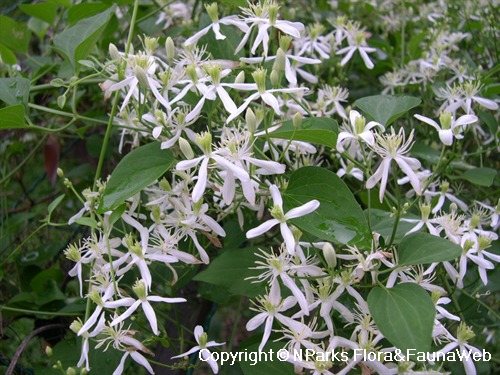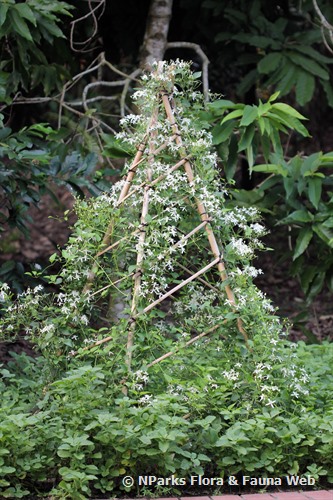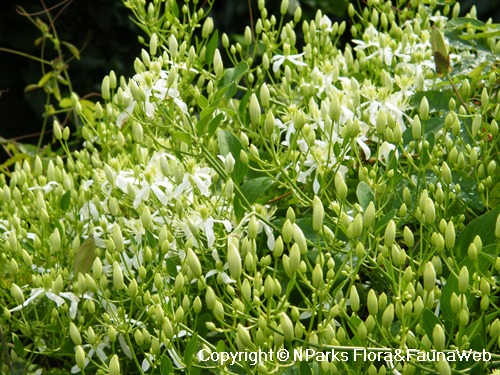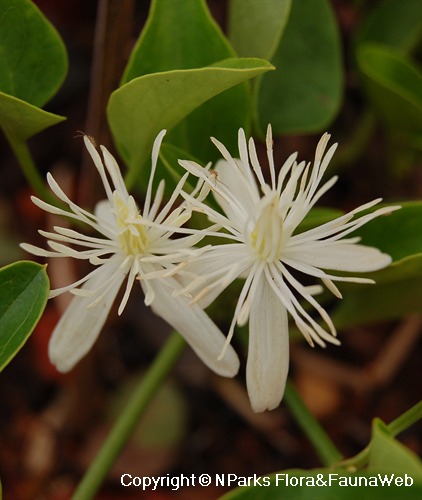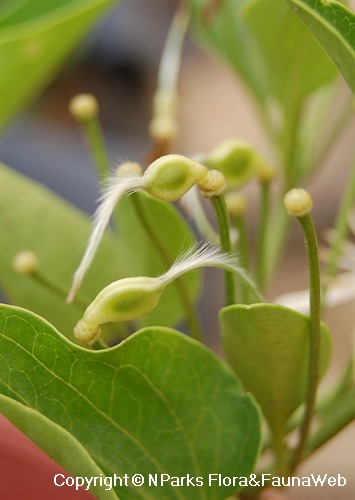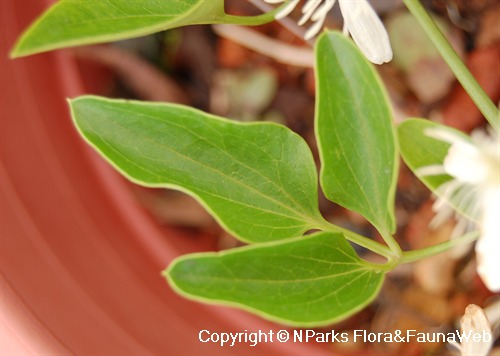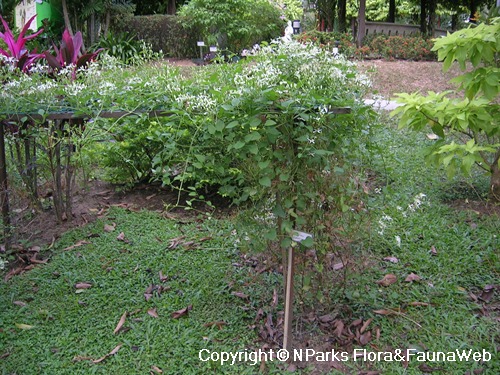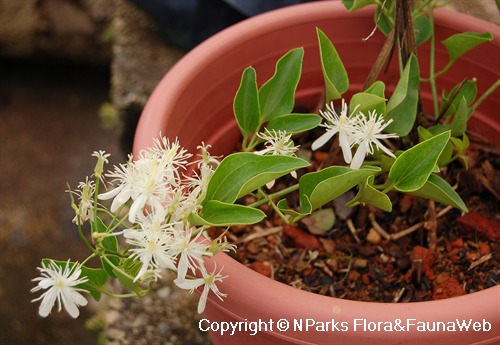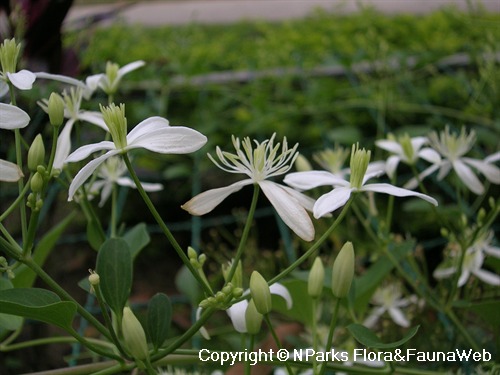
Back
Clematis aristata
| Family Name: | Ranunculaceae |
| Common Name: | Traveller's Joy Goatsbeard, Old Man's Beard |
Name
Classifications and Characteristics
| Plant Division | Angiosperms (Flowering Seed Plants) (Dicotyledon) |
|---|---|
| Plant Growth Form | Climber |
| Lifespan (in Singapore) | Perennial |
| Mode of Nutrition | Autotrophic |
| Plant Shape | Irregular |
| Maximum Height | 2 m to 6 m |
Biogeography
| Native Distribution | Australia |
|---|---|
| Native Habitat | Terrestrial (Coastal Forest) |
| Preferred Climate Zone | Sub-Tropical / Monsoonal, Temperate |
| Local Conservation Status | Non-native (Horticultural / Cultivated Only) |
Description and Ethnobotany
| Growth Form | Clematis aristata is a strong evergreen climber which has clusters of white flowers and can grow from 2-6 m. |
|---|---|
| Foliage | Leaves are 10-45 mm wide, ovate, simple, toothed margins, 3 parallel veins and are arranged opposite each other. The stalk of the leaves supports the plant by curling around the available support. Adult leaves are usually trifoliate with each leaflet ovate and has toothed margin. Seedlings leaves are purplish. |
| Stems | Stems are dark brown. |
| Flowers | Flowers are white, 35-50 mm wide, male and female flowers are on separate plant. Flowers are borne on short branches on leaf axils. Each flower has 4 petal-like sepals arranged in star pattern. |
| Fruit | Seedheads are fluffy. |
| Cultivation | Flowers require little care and flower for a long period of time. Prefers full sun to partial shade. Requires well-drained, rich-loamy soil. Propagation can be done by semi-wood cuttings or from seeds, but germination is slow. Plants can withstand heavy pruning. Train plant over support such as fence, trellis or pergola. |
| Etymology | The genus Clematis is from Greek name, which refers to climbing plants. The specific epithet aristata means with beard or awned, which refers to the fruits. |
Landscaping Features
| Desirable Plant Features | Ornamental Flowers, Fragrant (Flowers) (Day) |
|---|---|
| Landscape Uses | Skyrise / Balcony, Vertical Greenery / Green Wall, Suitable for Hanging Baskets, Container Planting, Trellis / Arbour / Pergola |
| Thematic Landscaping | Naturalistic Garden |
Fauna, Pollination and Dispersal
| Fauna Pollination Dispersal Associated Fauna | Butterfly-Attracting |
|---|
Plant Care and Propagation
| Light Preference | Full Sun |
|---|---|
| Water Preference | Moderate Water |
| Plant Growth Rate | Moderate |
| Rootzone Tolerance | Fertile Loamy Soils, Well-Drained Soils |
| Potential Problems | No serious insect or disease problems. |
| Propagation Method | Seed, Stem Cutting |
| Maintenance Requirements Remarks | Pruning is necessary to clear crowded growth to make way for new, more vigorous growth |
Foliar
| Foliage Retention | Evergreen |
|---|---|
| Mature Foliage Colour(s) | Green |
| Mature Foliage Texture(s) | Thick |
| Prominent Young Flush Colour(s) | Purple |
| Foliar Type | Compound (Trifoliate), Simple / Unifoliate |
| Foliar Arrangement Along Stem | Opposite |
| Foliar Attachment to Stem | Petiolate |
| Foliar Shape(s) | Non-Palm Foliage |
| Foliar Venation | Pinnate / Net |
| Foliar Margin | Serrate / Toothed |
| Typical Foliar Area | Mesophyll ( 45cm2 - 182.25 cm2 ) |
Floral (Angiosperm)
| Flower & Plant Sexuality | Unisexual Flowers , Dioecious |
| Flower Colour(s) | White |
|---|
| Flower Texture(s) | Smooth |
| Flower Grouping | Cluster / Inflorescence |
| Flower Location | Axillary |
| Flower Symmetry | Radial |
| Individual Flower Shape | Stellate / Star-shaped |
| Flowering Period | Free-Flowering |
| Flowering Habit | Polycarpic |
Image Repository
Others
| Master ID | 73 |
|---|---|
| Species ID | 1369 |
| Flora Disclaimer | The information in this website has been compiled from reliable sources, such as reference works on medicinal plants. It is not a substitute for medical advice or treatment and NParks does not purport to provide any medical advice. Readers should always consult his/her physician before using or consuming a plant for medicinal purposes. |


